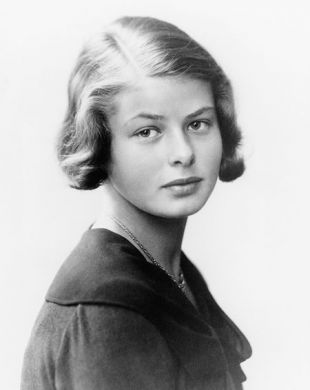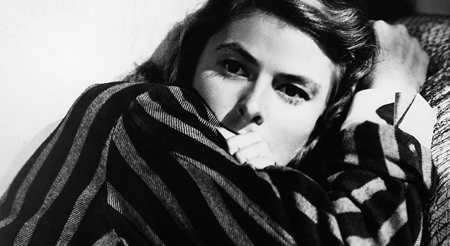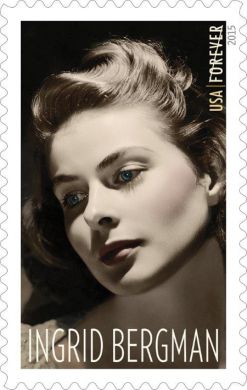|
|
||
|
Pro Tools
FILMFESTIVALS | 24/7 world wide coverageWelcome ! Enjoy the best of both worlds: Film & Festival News, exploring the best of the film festivals community. Launched in 1995, relentlessly connecting films to festivals, documenting and promoting festivals worldwide. Sorry for the disruptions we are working on the platform as of today. For collaboration, editorial contributions, or publicity, please send us an email here. User loginActive Members |
Toronto Honors Ingrid Bergman with August Retrospective
1915 was an especially auspicious year in terms of celebrity births, and 2015 is shaping up to be quite the year for centennial celebrations. Frank Sinatra, Edith Piaf, Billy Holiday, Arthur Miller and Orson Welles are all having a resurgence in popularity this year, due at least in part to the flood of articles, books, films and conferences taking place around the world to commemorate their talent and achievements, and remind us of the complex and often controversial lives they led, in between doing what they did the best. Also prominent on this year's list of celebrity centenaries is Ingrid Bergman. Born on August 29, 1915 in Stockholm, Sweden, she went on to distinguish herself as one of the most popular film actresses of the 20th century. She won Oscars, Golden Globes, Emmys and a Tony, and starred in many of the most acclaimed and successful films of the time. But, as is so often the case, it was what she endured and overcame in her personal life that makes an equally fascinating story, and perhaps makes her seem even more endearing to people, more than 30 years after her death. Starting August 22 through September 6, the TIFF Cinematheque (formerly Cinematheque Ontario) will present Notorious: Celebrating the Ingrid Bergman Centenary, comprising 10 films from the actress's Hollywood period, which includes popular classics such as Casablanca (1942), Gaslight (1944) for which she won her first Oscar for best actress, and Anastasia (1956), for which she won her second, along with her three films directed by Alfred Hitchcock, Spellbound (1945), Notorious (1946), and Under Capricorn (1949). The Bells of St. Mary's, (1945), For Whom the Bell Tolls (1943), Goodbye Again (1961), and Murder on the Orient Express (1974), for which she received her third and final Oscar, will also be featured. Additionally, three of Bergman's film collaborations with husband/director Roberto Rossellini are included in the Cinematheque's concurrent Summer in Italy series, which will feature Stromboli, Land of God (1950), Europa ’51 (1952), and Journey to Italy (1954). Perhaps the key to Bergman's legacy and enduring appeal is the fact that she defied easy categorization. Regardless of the role she played, she was never a “type”, even if she was cast as a seductress, refugee, nun, neurotic, or the girl who ran away and left you heartbroken. There was only one Ingrid. Although other actresses were considered for many of her most celebrated performances, today it seems impossible to imagine anyone else embodying those characters, or doing it so well. It was Bergman's ability to communicate a wide spectrum of emotional intensity in her roles and personify depth and complexity, often with a simple gesture or movement, that enriched her characters and gave viewers an added insight or at least hint at what thoughts and motivations made that particular person tick. And the fact that she was stunningly beautiful didn't hurt, either. When she was on screen, audiences were transfixed. Whatever she emoted came straight through the lens and hit viewers in their most vulnerable spot, combining what legendary film critic James Agee called “poetic grace with quiet realism.” Born in Stockholm to a Swedish father and German mother, Bergman's early life reads like the plot of a soap opera or Dickens novel. Her mother passed away when Ingrid was only two years old. Her father, who ran a photography shop, encouraged his daughter's artistic pursuits, hoping she might become an opera singer, and paid for voice lessons for three years. Unfortunately, he too passed away a few weeks before Ingrid's 14th birthday, after which the orphaned only child went to live with relatives. In 1932 at the age of 17, she auditioned and won a scholarship to study at Sweden's Royal Dramatic Theatre School, where Greta Garbo had studied several years earlier. Bergman's big break came during her next summer vacation, when she was hired by a Swedish film studio, which eventually led to her discontinuing her studies at the theatre school. In the coming years, she appeared in several Swedish films that brought her professional recognition, but it was her portrayal of Anita Hoffman in director Gustaf Molander's 1936 film Intermezzo that brought her to the attention of Hollywood producer David O. Selznick, who was convinced that Bergman's natural Nordic beauty and acting talent would make her a Hollywood success, so he signed her to star in the film's English language remake, directed by Gregory Ratoff. Bergman arrived in Hollywood in May 1939. By now, she was married to a dentist, Peter Lindström, and had a daughter, Pia, born in 1938. The remake of Intermezzo was a huge success, and after completing one more film in Sweden, Bergman returned to Hollywood to appear in a series of films in 1941, including Adam Had Four Sons, Rage in Heaven and Dr. Jekyll and Mr. Hyde.
But it was her role as Isla Lund starring with Humphrey Bogart in Casablanca (1942) that took her career to the next level. It was a major box-office hit, and set Bergman on a course of smooth professional sailing for the rest of the war years through the end of the decade, during which she made most of her best loved films. She received her first Academy Award nomination for her performance as Maria in For Whom the Bell Tolls (1943) and won her first Oscar portraying Paula, the wife driven to madness in Gaslight (1944) directed by George Cukor. Her role as the nun Mary Benedict, playing opposite Bing Crosby, in The Bells of St. Mary's (1945) garnered her another Oscar nomination for best actress. More accolades followed, including a Tony for her Broadway performance in Joan of Lorraine in 1947 and another Oscar nomination for best actress for Joan of Arc (1949). However, Joan of Arc was not a commercial success, and having grown weary of Hollywood, Bergman wrote a letter to Italian neo-realist director Roberto Rossellini in which she wrote: “I saw your films Open City and Paisan, and enjoyed them very much. If you need a Swedish actress who speaks English very well, who has not forgotten her German, who is not very understandable in French, and who in Italian knows only “ti amo,” I am ready to come and make a film with you.” Strictly professional or overtly flirtatious? Whatever Bergman's initial aspirations were, what ensued resulted in one of the biggest scandals Hollywood or America had experienced in decades. During the location filming of Stromboli, Bergman and Rossellini had an affair, Bergman became pregnant, left her husband Peter Lindström and filed for divorce-- as well as custody of their daughter, although it was Lindstrom who ultimately prevailed in the protracted custody battle. Bergman gave birth to her son, Renato Roberto, just days before her divorce with Lindström was finalized, and she and Rossellini married soon afterwards.
Although Bergman had been involved in brief extramarital affairs before this, with director Victor Fleming, photographer Robert Capa, and actor Gregory Peck, these were never publicized. Her affair with Rossellini was a completely different animal. The fact that they were truly, unabashedly in love with each other and even “did the right thing” by marrying didn't seem to matter. Today, it seems impossible to imagine such circumstances would result in an actress being so thoroughly, mercilessly vilified by the tabloid press and gossip columnists of the day. But it didn't stop with the media. Astonishingly, Bergman was personally denounced by Senator Edwin C. Johnson of Colorado on the floor of the United States Senate for more than an hour on March 14, 1950. Johnson stated that she “had perpetrated an assault upon the institution of marriage”, was “a powerful influence for evil” and “Hollywood's apostle of degradation.” Settling in with Rossellini and her new life in Italy, Bergman gave birth to twin daughters Isabella and Isotta in June 1952. Following Stromboli, she starred in three more of Rossellini's films, Europa '51 (1952), Journey to Italy (1954), and Fear (1954). Although today revered as important works, they were not widely distributed in the United States upon their initial release. After a decade of steady Hollywood releases, Ingrid Bergman had practically disappeared from American movie screens. And it would be some time before she returned. Bergman's next Hollywood movie was Anastasia (1956). Produced by 20th Century Fox, it proved to be a major comeback role, for which she received the Academy Award, Golden Globe, and New York Film Critics Circle Award for Best Actress. After years of exile, Ingrid was back on top, the public was thrilled, and all was forgiven. At least in public.
In 1957, Bergman married her third husband, Lars Schmidt, a theatrical entrepreneur from a wealthy Swedish shipping family. It would prove to be the most enduring marriage of her life. They divorced in 1975 but remained close. Throughout the 1960s and 70s she continued to work regularly, appearing in films and occasionally on the stage. Among the highlights of her later career were her performances in the popular comedy Cactus Flower (1969) and Murder on Orient Express (1974), for which she received her third Oscar, for Best Supporting Actress. Another Oscar nomination followed for Ingmar Bergman's Autumn Sonata (1978). For her portrayal of Israeli prime minister Golda Meir in A Woman Called Golda (1982) she received a posthumous Emmy and Golden Globe award. It was her final screen role before her death due to breast cancer on August 29, 1982, her 67th birthday.
And for those who can't get enough Bergman biographical fare, back in June it was reported in the trade papers that James Mangold is attached to direct Seducing Ingrid Bergman, which tells the story of the brief but passionate love affair between the actress and famous war photographer Robert Capa in Paris after WWII, based on the book of the same name, adapted for the screen by Arash Amel. As to who Mangold will cast in the lead roles is anybody's guess, but finding an actress who can portray the young Bergman should prove to be a challenging task to say the least.
Notorious: Celebrating the Ingrid Bergman Centenary runs from August 22 through September 6, 2015 at the Bell Lightbox, 350 King Street West. 30.07.2015 | Robert Bodrog's blog Cat. : Alfred Hitchcock Arash Amel Cary Grant centenary centennial Cinematheque David O. Selznick Gregory Peck Humphrey Bogart Ingrid Bergman Isabella Rossellini James Mangold Lars Schmidt Notorious Robert Capa Roberto Rossellini tiff toronto Toronto International Film Festival Victor Fleming Honors PEOPLE
|
LinksThe Bulletin Board > The Bulletin Board Blog Following News Interview with EFM (Berlin) Director
Interview with IFTA Chairman (AFM)
Interview with Cannes Marche du Film Director
Filmfestivals.com dailies live coverage from > Live from India
Useful links for the indies: > Big files transfer
+ SUBSCRIBE to the weekly Newsletter DealsUser imagesAbout Robert BodrogThe EditorUser contributions |








 In other Bergman news, in August the U.S. Postal Service and Posten AB of Sweden will honor Bergman with a jointly issued stamp in the Legends of Hollywood series, available from August 20, featuring an image of Bergman taken circa 1940 by photographer Laszlo Willinger, known for his celebrity portraits, which has been digitally colorized by artist Kristen Monthei.
In other Bergman news, in August the U.S. Postal Service and Posten AB of Sweden will honor Bergman with a jointly issued stamp in the Legends of Hollywood series, available from August 20, featuring an image of Bergman taken circa 1940 by photographer Laszlo Willinger, known for his celebrity portraits, which has been digitally colorized by artist Kristen Monthei.





 Bodrog Robert
Bodrog Robert 


